- 24/7 Free Consultation: (888) 424-5757 Tap Here To Call Us
Can I Sue a Rideshare Company as a Driver on the Road in Chicago?

With the rising popularity of rideshare services like Uber and Lyft in Chicago, more people are opting for the convenience and efficiency these platforms offer. However, the increase in rideshare usage has also led to an increased risk of motor vehicle accidents involving rideshare drivers.
A study from Chicago Booth highlights a concerning trend: the introduction of rideshare services has led to a roughly 3% increase in motor vehicle fatalities and fatal accidents. Given these statistics, the question arises: “If a rideshare driver hits my car, can I sue Uber or Lyft in Illinois?”
This is a critical question for anyone involved in such accidents, as this can affect how compensation is pursued. At Rosenfeld Injury Lawyers, our team can help you answer the question, “Can I sue a rideshare company as a driver on the road?” and decide whether or not to file a claim.
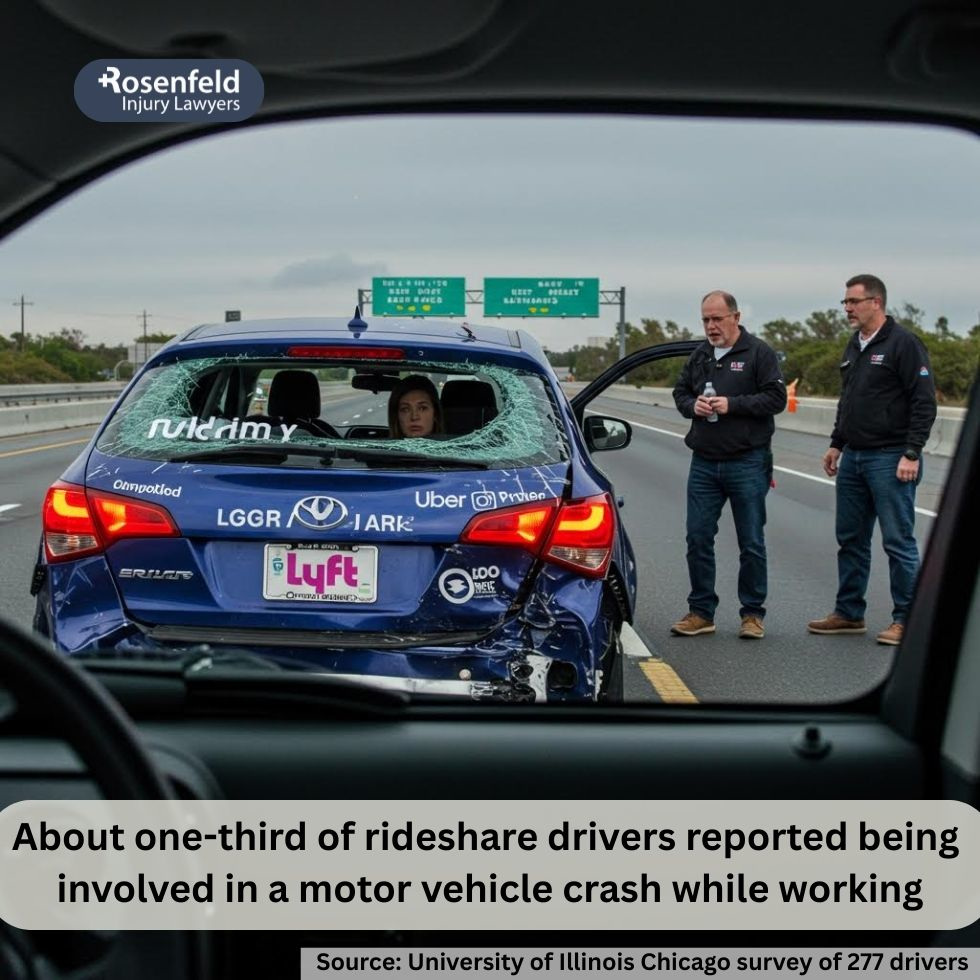
Understanding Rideshare Operations in Chicago
In the City of Chicago, rideshare drivers, also known as Transportation Network Providers (TNPs), must adhere to specific rules and regulations to operate legally. Per Municipal Code 9-104-020, TNP drivers must obtain a Chicago TNP Chauffeur License before they can begin offering rideshare services. This license ensures the driver has met all the requirements set out by the city.
Additionally, the vehicles used for rideshare operations must be registered with the City of Chicago. Once registered, the city issues a one-page Emblem that verifies both the TNP Chauffeur License and the vehicle registration. Under Municipal Code 9-114-110, this Emblem must be displayed whenever the TNP chauffeur and vehicle are in operation within the city limits.
Driver Status in Illinois
In Illinois, rideshare drivers are typically classified as independent contractors rather than employees. This classification has significant implications for liability and compensation.
Drivers are considered to operate their vehicles as separate businesses as independent contractors. Consequently, if they hit another car, the company is generally not directly liable for the accident, complicating the process of seeking compensation. Therefore, it can be difficult to sue a rideshare company.
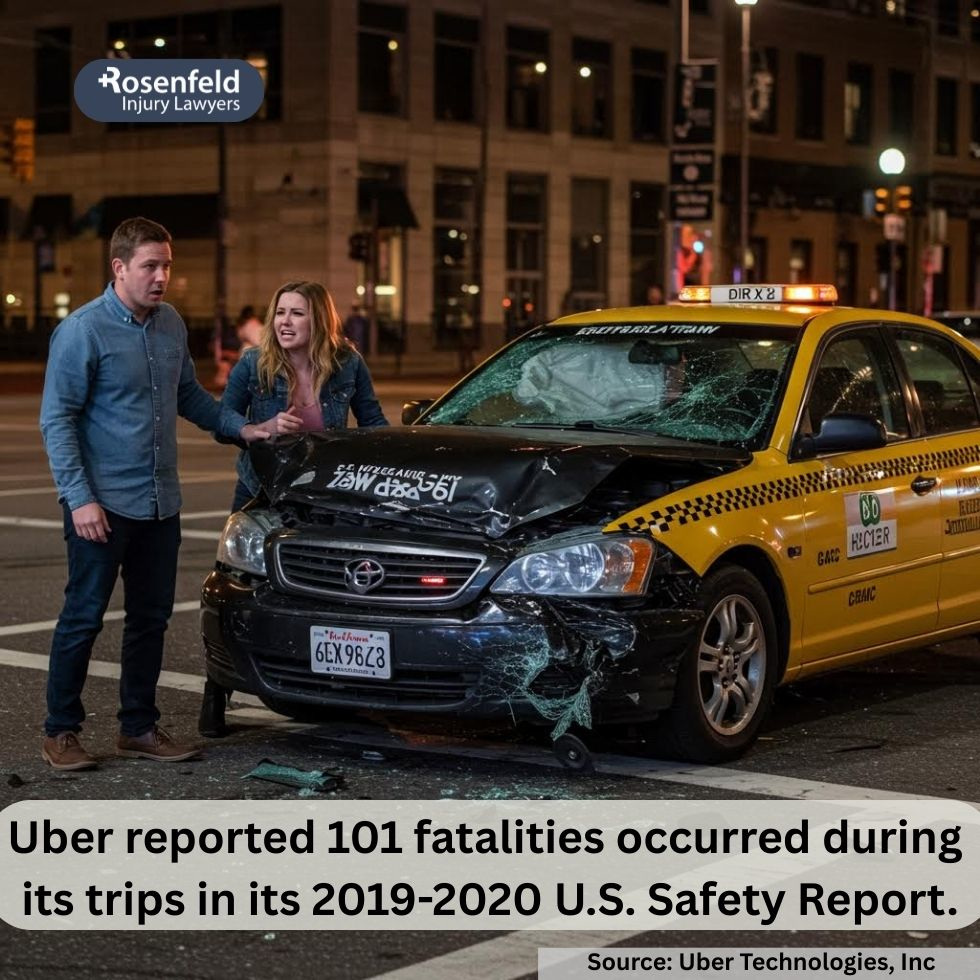
Legal Framework for Rideshare Accidents in Illinois
Understanding the legal framework for rideshare accidents in Illinois involves looking at several key aspects, including recent legislative updates and the role of an employer versus independent contractors.
Illinois Laws and Regulations
The ability to sue rideshare companies in Illinois is nuanced and highly dependent on specific circumstances and legal interpretations. For instance, in 2023, a court ruled that a claim involving an injured party could proceed in a lawsuit against Uber.
This decision underscored that, under certain conditions, the courts may be able to hold rideshare companies liable. Conversely, another 2023 case emphasized a different approach, mandating that negligence claims against Uber be settled through arbitration rather than in court.
Any injured party or legal representative must carefully consider the specific legal contexts, recent precedents, and applicable laws and regulations when pursuing claims related to rideshare accidents.
Employee vs. Independent Contractor: Implications on Legal Responsibility
The classification of rideshare drivers as either employees or independent contractors significantly impacts legal responsibility in the event of an accident. If rideshare drivers were classified as employees, the rideshare companies would typically bear liability for the drivers’ actions while they are on the job.
On the other hand, rideshare drivers are seen as operating their own businesses as independent contractors. This classification generally shields rideshare companies from direct liability for their drivers’ actions.
Instead, the financial burden often falls on the other driver and their own insurance coverage. This independence means injured parties might find it more challenging to sue the rideshare company directly.
Understanding these nuances is essential for anyone involved in these incidents, whether they are drivers, passengers, or other affected parties.
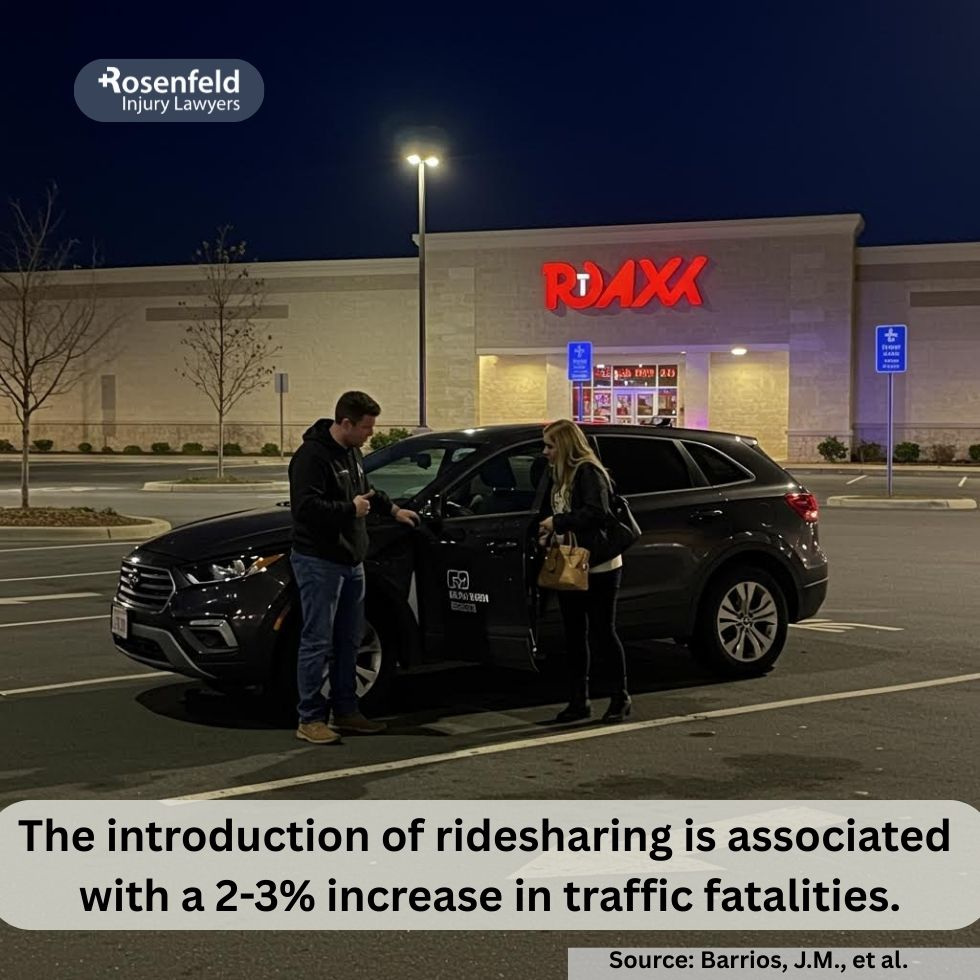
Scenarios Where You Can Sue Uber or Lyft in Chicago
After an Uber or Lyft accident in Chicago, there are specific scenarios where the rideshare company itself could be held directly liable, including:
- Negligent Hiring: If it can be established that Uber or Lyft failed to vet a driver properly, the company might be held legally responsible for any resulting accidents or injuries.
- Inadequate Training: Similarly, insufficient training of drivers can also be grounds for a lawsuit.
- Violations of Company Policies or Laws: If Uber or Lyft do not enforce their safety policies or fail to adhere to local transportation laws, and this contributes to an accident, they can be held directly liable.
- Insurance and Coverage Issues: Uber and Lyft offer insurance coverage for accidents that occur during a ride or while a driver is en route to pick up a passenger. However, if the insurance policy is faulty, the company might face a lawsuit.
These scenarios and exceptions provide potential avenues for holding rideshare companies directly liable in cases where their oversight, policies, or actions contribute to an accident.
Alternate Recourse Options
As you navigate the complexities of pursuing legal action, it’s crucial to explore all available recourse options when you can’t hold Uber or Lyft directly liable.
No-Fault Insurance Claim
A no-fault insurance claim allows individuals involved in an accident to receive compensation from their own insurance company, regardless of who was at fault. This type of insurance is designed to cover medical bills, lost wages, and other out-of-pocket costs quickly. However, Illinois is an at-fault state, so fault must be determined if you file a personal injury claim.
Sue the Driver
If the rideshare company cannot be held liable, another option is to sue the driver directly. This route is applicable when the driver’s negligence or misconduct directly leads to an accident or injury.
This personal injury claim would aim to recover damages for medical expenses, property damage, pain and suffering, and other related costs, while holding them legally responsible.
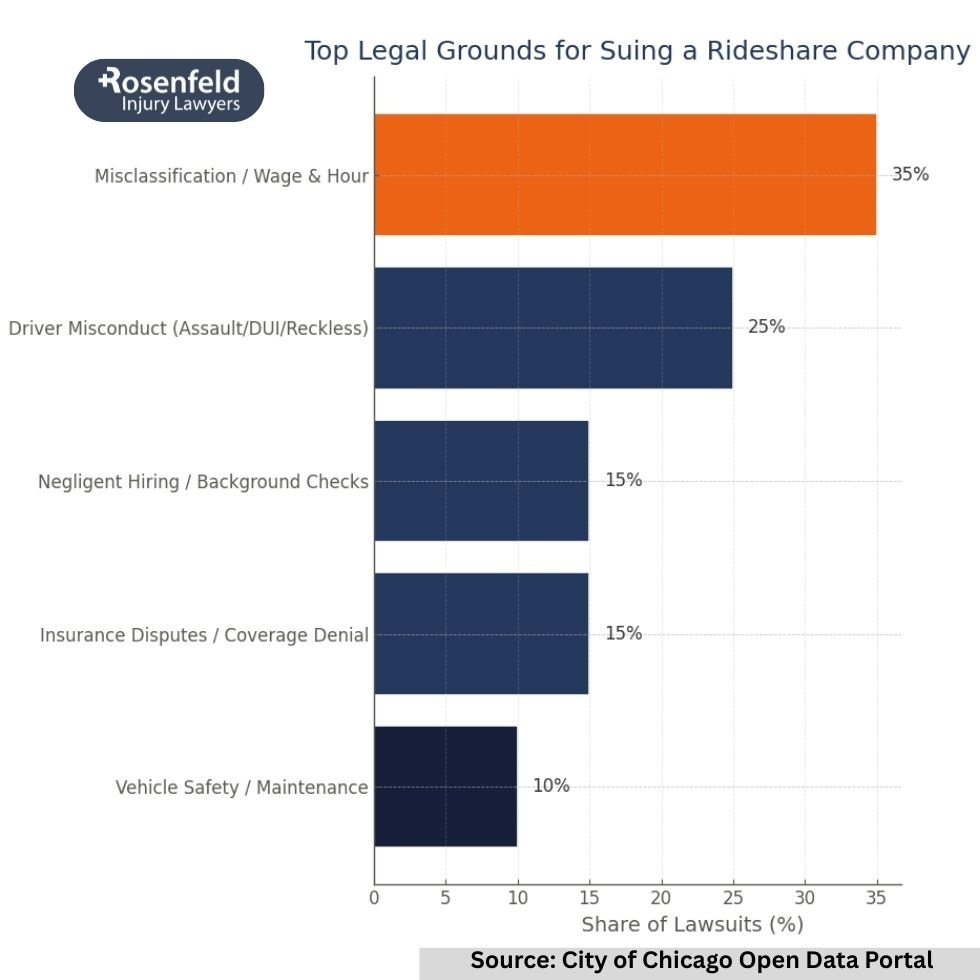
Steps to Take If Hit by a Rideshare Driver
If you’re involved in an incident in Chicago, taking the right steps immediately afterward is vital to ensure your safety and to protect your rights. Here are some critical actions to consider:
- Check for injuries: If anyone is injured, call 911 and inform the dispatcher that you require emergency medical services immediately. Do not attempt to move injured individuals unless there’s an imminent threat.
- Move to safety: If you can do so safely, move away from traffic lanes and out of harm’s way.
- Call the police: Even for minor accidents without serious injuries, it’s important to contact the police and file a report.
- Wait for help: Stay at the scene until help arrives unless your safety is at risk.
- Exchange information: While waiting for authorities, exchange contact, car, and insurance information with the Lyft or Uber driver.
- Document the scene: Take photos of all vehicles from multiple angles, showing damage done and any street signs or landmarks that can help establish where the accident occurred. If there are witnesses around, ask for their contact details.
- Report to the rideshare company: Report the accident to the rideshare company. Use their app or website, as Uber and Lyft have dedicated portals for these situations.
- Save any evidence: Preserve physical evidence of the crash, such as damaged items or personal effects, and keep digital copies of all communications with the rideshare driver and insurance company.
- Seek medical attention: It is crucial to see a doctor even if your injuries initially appear minor, as some symptoms may not become apparent immediately, and keep all medical records.
- Contact a car accident attorney: Consult with a personal injury attorney who specializes in rideshare accidents.
- Inform your insurance company: Notify your own insurance company about the crash. They can provide guidance on how coverage works for accidents with rideshare vehicles.
Contacting Your Own Insurance Company
When you’re involved in a rideshare-related accident, it’s essential to have some knowledge about dealing with your insurance carrier.
Understanding Your Insurance Policy
When involved in a rideshare-related accident, the first step is to familiarize yourself with your own insurance policy. Research what expenses might be reimbursed and the steps you’ll need to take during the personal injury claims process.
Dealing with Rideshare Drivers’ Insurance
Rideshare drivers are required to have their own personal insurance policies. Uber and Lyft, for example, provide liability coverage for their drivers when they are actively transporting a passenger or on their way to pick one up.
However, there may be gaps in coverage when the driver is not logged into the app. Understanding these nuances is crucial when handling claims involving rideshare drivers.
Potential Insurance Coverage Complications
Navigating the complexities of dealing with rideshare drivers’ insurance can be challenging. There may be disputes over which insurance policy is applicable or whether the driver’s personal auto insurance covers the incident. In some cases, the rideshare company’s insurance may deny claims, leading to further complications.
By understanding your insurance policy and the specifics of rideshare coverage, you can effectively navigate the claims process and mitigate potential complications.
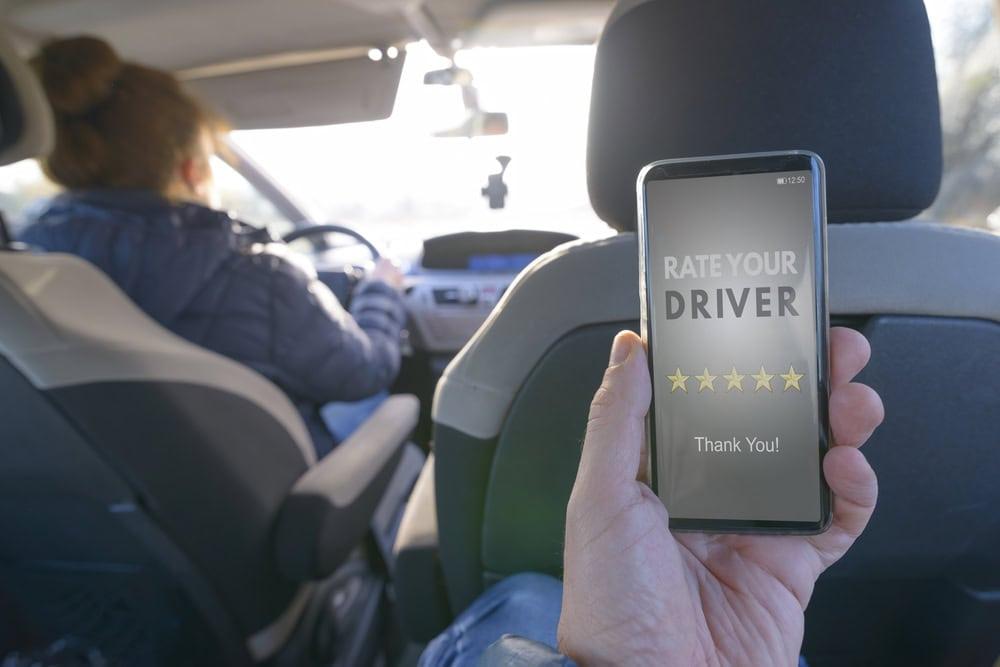
Contact A Chicago Rideshare Accident Lawyer Near You
When dealing with the aftermath of a rideshare accident, contacting an experienced Chicago rideshare accident law firmcan be invaluable. Here’s how they can assist you in this process:
- Handling Insurance Claims: They can manage communications with insurance companies, help resolve disputes, and ensure you receive fair compensation.
- Gathering Evidence: An attorney can assist in collecting and preserving crucial evidence such as witness statements, accident reports, video footage, and medical records.
- Providing Legal Representation: Should your case go to court, your lawyer will advocate on your behalf and fight for you in court, striving to achieve the best possible outcome.
Benefits of Local Expertise
Choosing a Chicago car accident lawyer with specific knowledge of the local legal landscape for rideshare accidents comes with several benefits:
- Familiarity with Local Laws: A local attorney will have a deep understanding of Illinois state laws and Chicago regulations that may impact your case.
- Connections with Local Experts: They can connect with local investigators, medical professionals, and expert witnesses to build a strong case.
- Contextual Knowledge: Knowledge of common accident sites, local traffic patterns, and area-specific rideshare regulations can provide critical insights that out-of-town lawyers might miss.
- Accessibility: Proximity allows for easier meetings and more effective communication, fostering a better working relationship.
If you are a Chicago resident involved in a rideshare accident, it is crucial to consult with a knowledgeable Chicago personal injury lawyer. Our expertise and understanding of the local legal environment can significantly enhance your chances of a successful outcome. Don’t navigate this challenging process alone. Contact us today at 888-424-5757 or fill out our online form.
All content undergoes thorough legal review by experienced attorneys, including Jonathan Rosenfeld. With 25 years of experience in personal injury law and over 100 years of combined legal expertise within our team, we ensure that every article is legally accurate, compliant, and reflects current legal standards.







